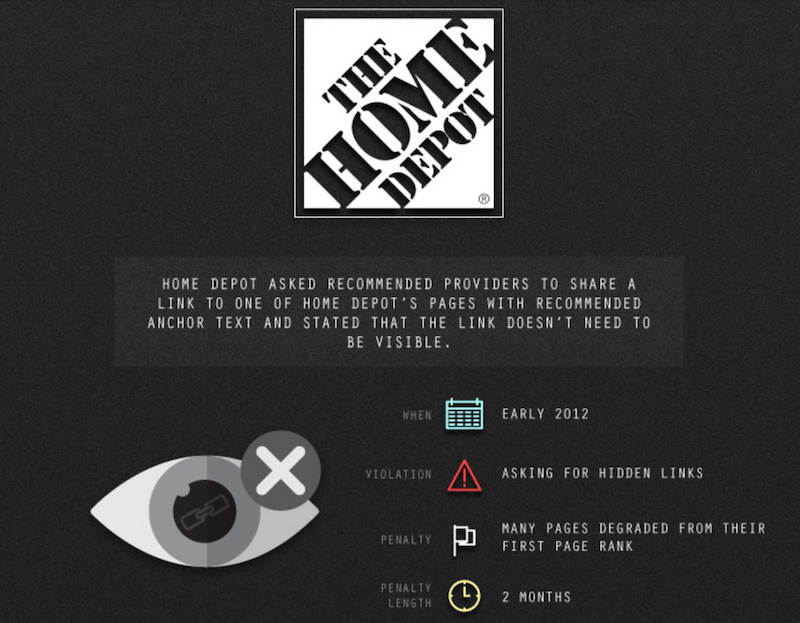Just in case you’re ever tempted to try a few black-hat practices to manipulate your search positions in Google, here are 12 tales to persuade you otherwise.
Whether using cloaking, unnatural paid-for links, doorway pages, spam or hidden links, Google is swift and brutal with a manual penalty. Even if the transgression isn’t necessarily your own fault.
In fact for some of the following well-known brands, they’re merely guilty of not paying enough attention or not being educated enough when it comes to what Google cracks down on.
There’s some great advice here about what to do when hit with a manual penalty, but for now, let’s check out the circumstances of 12 high profile cases and the damage meted out by the penalty.
For more information, you can check out the full infographic and blog post from Digital Third Coast.
Please note: the following ‘present-day’ traffic loss predictions were calculated using SimilarWeb’s data by Digital Third Coast.
The Washington Post
In October 2007, The Washington Post was caught selling links on their blog without adhering to Google’s best practice when included paid-for links. The paper’s PageRank value dropped from PR7 to PR5 and was likely restored after a couple of months.

Today this penalty would lead to a potential loss of traffic of around 76.4 million.
WordPress
In March 2005, WordPress was penalised for the use of doorway pages. These are webpages used for spamming a search engine by creating multiple pages for specific high-value phrases but they just send visitors to the same destination.
WordPress hosted 168,000 articles about high-cost advertising keywords, written by a third-party, and were penalised by Google for two days. During this period, WordPress didn’t rank for its own name and its PageRank was reduced to zero.

Today this penalty would lead to a potential loss of traffic of around 10.08 million.
BBC
In March 2013, the BBC was penalised for unnatural links on a single page, although the details haven’t been confirmed. Rumour suggests it wasn’t the BBC’s fault, rather a RSS feed scraper. The page was downgraded by Google in rankings.

Today this penalty would lead to a potential loss of traffic of around 3.52 million for one day.
BMW
In February 2006, BMW was caught manipulating search results for the term ‘used car’ by redirecting searchers to the regular BMW company page when they clicked through.
For this, the site was completely removed from search results for three days.

Today this penalty would lead to a potential loss of traffic of around 71,600.
Mozilla
In April 2013, Mozilla was penalised for hosting a webpage with 12mb of spam from 21,169 user comments. This isn’t Mozilla’s fault, but it’s a lesson to us all to make sure any user generated content in comment sections is cleaned up.
The page was downgraded in rankings, and Mozilla ended up removing the offending page all together.

Today this penalty would lead to a potential loss of traffic of around 1.25 million for one day.
Genius
Back when Genius was known as Rap Genius, the company was very publicly penalised by Google for asking bloggers to provide lyrics in exchange for unnatural links promotion.
This led to a 10 day ban, where Rap Genius didn’t rank for its own name and suffered a drop in PageRank.

Today this penalty would lead to a potential loss of traffic of around 3.8 million.
eBay
This one is a little mysterious, as neither eBay nor Google has confirmed the details, but in 2014 the company received a manual penalty and an unspecified drop in rankings.

Today this penalty would lead to a potential loss of traffic of around 6.11 million for one day.
Overstock
In February 2011, Overstock offered discounts to schools in exchange for links back to their own sire and artificially raise their rankings for specific products.
This led to a two month ban on the company ranking for its own brand name.

Today this penalty would lead to a potential loss of traffic of around 12.17 million.
JC Penney
Showing that a penalty isn’t necessarily the fault of the company, but rather an errant SEO using black hat tactics, JC Penney suffered a huge drop from the first SERP for multiple search terms thanks to ‘copious paid links’ found on unrelated sites. This lasted two months.

Today this penalty would lead to a potential loss of traffic of around 12.33 million.
The Home Depot
In 2012, The Home Depot asked its partners to link to their site with recommended anchor text. If this wasn’t bad enough they also suggested that these links could be hidden (i.e. using white text on white background, placing text behind an image).
This led to a two month drop from the first SERP for many of its product pages.

Today this penalty would lead to a potential loss of traffic of around 37.13 million.
But who punishers the punisher?
Well it may surprise you to learn that the answer to this question is Google.
Google really isn’t shy of making an example of itself, based on the following self-transgressions…
Google Chrome
Google was guilty of buying links to promote its own browser in January 2012. Although they claimed this was accidental, Google still penalised itself with lowered rankings for the Chrome homepage for a two month period.

Google AdWords
Google AdWords was found guilty of cloaking in July 2010. A spokesperson stated that, “some Google support pages were inadvertently showing different content to the Google crawler than to users.”
So again, this is more of an accident, but to set an example Google still punished itself with degraded ranks for an unknown period of time.

source https://searchenginewatch.com/2016/09/22/12-companies-hit-with-a-google-manual-penalty/
No comments:
Post a Comment